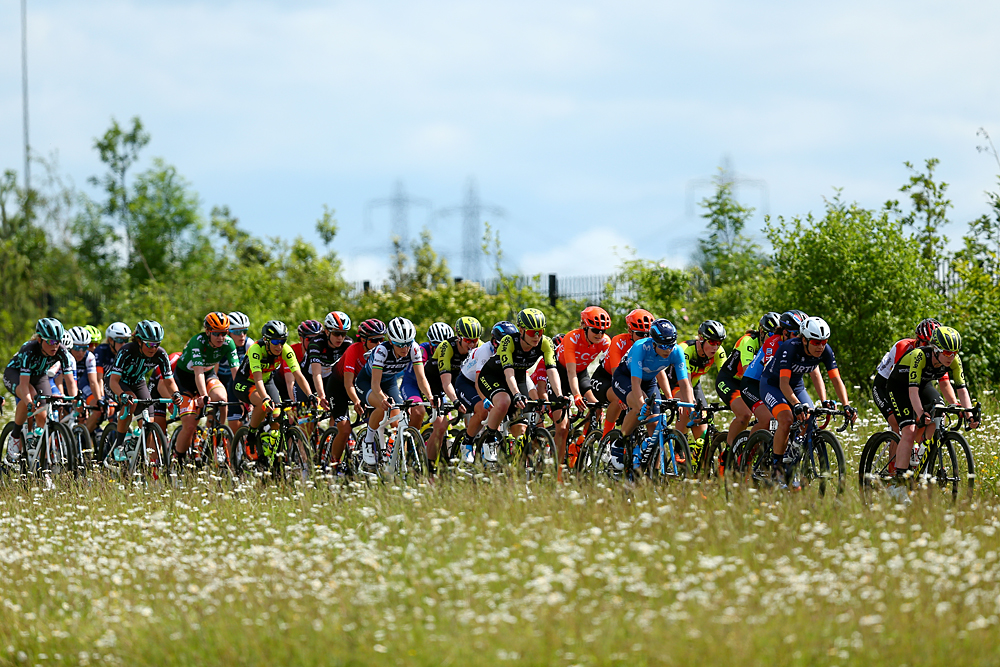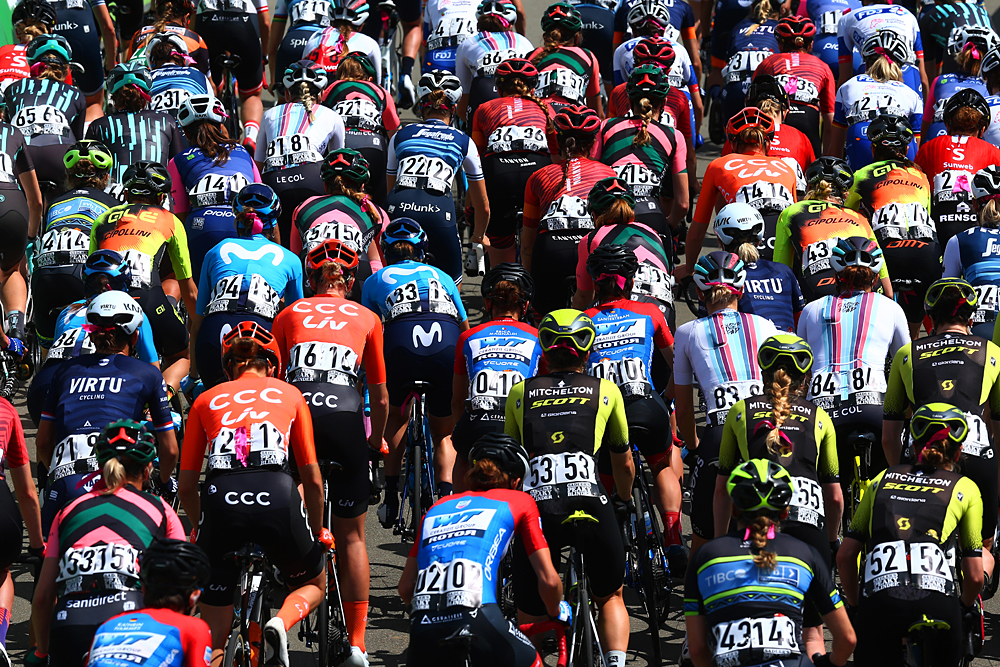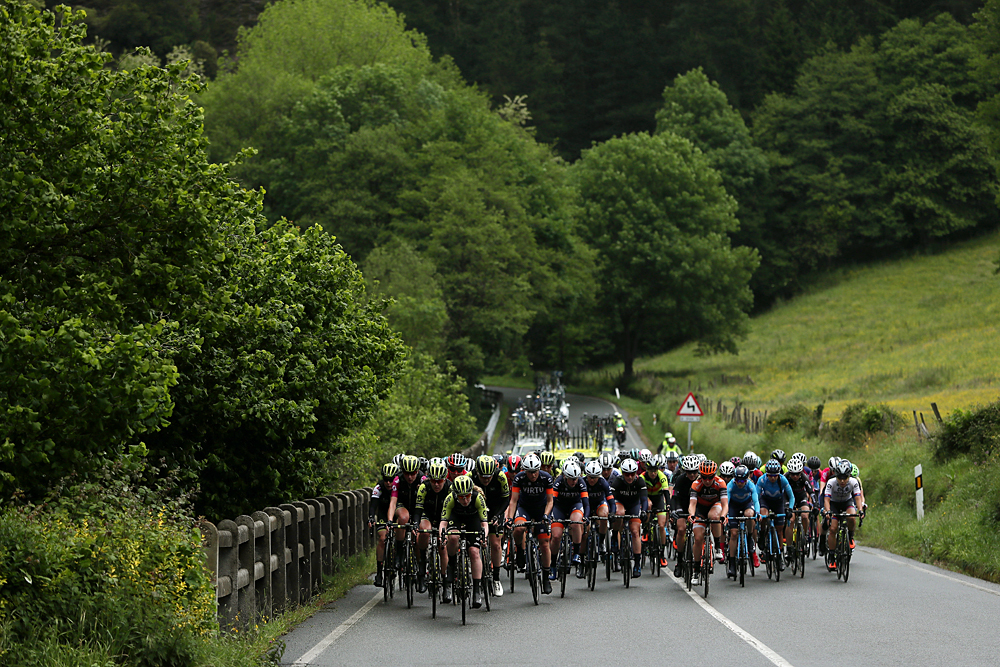The Cyclists' Alliance: The de facto union for women's cycling
More protection for women, recognition from UCI, and a search for funding among future targets




In just 18 months, The Cyclists' Alliance (TCA) has become the de facto representatives for women in professional cycling, and it aims to establish itself more formally as the union that oversees women's cycling in the future. Cyclingnews spoke with the association's co-founder Iris Slappendel about the TCA's goals for expansion, intent to become recognised by the UCI and search for more funding to support critical initiatives that directly benefit the women in the sport.
Slappendel, Elvin and Small launch The Cyclists' Alliance
Five squads to make up top-tier UCI Women's WorldTeams in 2020
Exclusive: Women's minimum salary will equal men's Pro Continental level by 2023
Maternity leave added to Women's WorldTeam contracts in 2020
Updated UCI Code of Ethics targets anonymity concerns for abuse victims
Slappendel urges cyclists to file formal complaints with UCI against abusers
"It's a goal of ours to be recognised by the UCI as the official union for the women in cycling," Slappendel told Cyclingnews. "We're aiming to have a seat at the Pro Cycling Council and at the Road Commission and Women's Commission, to have a designated seat on these Commissions."
Slappendel, Carmen Small and Gracie Elvin make up the executive board, and they co-founded The Cyclists' Alliance and at the end of 2017. Its stated goal is to represent the competitive, economic, and personal interests of all professional women cyclists. That includes improving career opportunities, advocating for fairness and equality, resolving disputes, and to support and elevate the popularity of the sport.
The association also relies on the work of its advisory board that includes Brendan Schwab (Executive Director, Uni World Players Association. Labour & human rights lawyer), EU Athletes (Athletes Right advisors), Marianne Vos (UCI Athletes Commission Women's Road representative), Joe Harris (business consultant), Kristen Worley (Gender rights advisor), Marnix van Ark (Legal advisor employment right, Staywise), Eric Vile (Legal advisor) and Roos Hoogeboom (Membership and treasurer).
Slappendel provided Cyclingnews with a copy of its 18-month report that highlighted the TCA's achievements, what it is currently working on and its future goals.
There are officially 120 riders signed up as members, but the TCA supports upwards of 150. The association has mediated 12 cases between riders and teams, 10 riders with contact advice, eight riders with release forms and supported one arbitration. It has also advised the UCI on many critical areas of the new Women's WorldTour reforms such as upgraded standard contracts that include minimum salary, insurances and maternity leave, along with advice regarding recent updates to the Code of Ethics. It has also been involved in discussions with the Women's WorldTour working group and Road Commission.
Internally, TCA offers athletes free services such as legal help, contract support, independent consultations with a nutritionist and sports psychologist, mentorship initiatives, and supplemental insurances at a reduced rate.
The latest race content, interviews, features, reviews and expert buying guides, direct to your inbox!
"With limited resources, we have done quite a lot, and that shows the motivation of the Board along with the Advisory Board and our network that has been so helpful," Slappendel told Cyclingnews. "We invested a lot of time before we started The Cyclists' Alliance, and it helped to have a good plan, mission and objectives to focus on before we launched.
"Once we started, it was more work coming to us than we ever expected, but I think it helped to have a good base.
"We are proud that this became something directly from the riders. We have helped 150 riders. Not every rider has the finances to sign up as a member, but we still help them. We also help riders, maybe without them knowing, by way of the new contracts from the UCI and the other work we have done with national federations, which all of the riders benefit from."
The 18-month report provides an analysis of the TCA's finances, and a surprisingly low annual income of €7,631 considering all that it has accomplished in a short period. All of TCA's funding comes from member fees and donations, so far, and all its work on the rider's behalf is voluntary. Because of this, its annual expenses were only €1,196. The remaining profit of €6,435 is saved as equity just in case the funds are needed for unexpected legal costs, travel and accommodation.
"We are truly thankful for the help of our partners like Velotutor (website development and marketing) and Staywise (legal advice), as well as our cooperation with EU Athletes and UNI World Players Association – both of whom have been invaluable resources and teachers for our ongoing mission to support [the athletes]," as stated in the report.
TCA has recently added new benefits such as the concussion protocol that is free for members, independent medical consultation by former cyclist Dr. Claire Rose, and certified psychologist Valentina Scandolara, who is also retired from competition.
"We want to expand on what we are doing. Some short-term things still need to be done such as minimum working conditions for all teams, which is what we are focussed on now," said Slappendel, who also spoke to the need for more live coverage of women's races. TCA helped with discussions that led to a recently announced new one-hour post-race broadcast of the Giro Rosa from Trek and Voxwomen.
"On the greater scheme of things, we focus on different ways to make women's cycling sustainable. We believe that women's cycling is still a blank sheet that we can build our sport on, and we can create these new media opportunities and exposure of the sport. We will keep focusing on this in the future. If we can be part of these kinds of initiatives, then the riders will benefit from them."
Recognition
Slappendel believes that in light of the TCA's current services and initiatives and its success in supporting women in professional cycling over the last 18 months, that it deserved to be formally recognised by the UCI as the association that represents all women in professional cycling.
Another association that has an expressed interest in representing women's cycling is the CPA women's chapter. The association announced recently that it's chapter head, Alessandra Cappellotto, successfully helped implement the protocol for Extreme Weather Conditions for the Women's WorldTour races. But the CPA's women's chapter has been relatively quiet in comparison to the TCA, at least publicly.
Slappendel said that the UCI intends to announce one designated association in September.
"The UCI has decided to wait and see how both associations progress before recognising one. They will decide at the Management Meeting in September at World Championships," Slappendel said. "At times it seems like there is competition for who can represent the women, but to me, it's not about the CPA or The Cyclists' Alliance. It's about the best representation for the women."
Slappendel said that navigating the process of becoming recognised by the UCI is challenging because there are no set guidelines with which to follow. "We do what we can to help the riders, and we hope that will be enough to earn the recognition," said Slappendel.
"We would like a bargaining agreement with the UCI teams so that it is clear for everyone who is representing who. If there is a teams union, as well, that will accomplish creating a clear landscape. Currently, the UCI is making regulations on the Women's WorldTeams [as part of the new reforms, ed.] but there are still all of these other women's teams."
Funding
Slappendel said that the TCA is at a point where it will require more funding to continue to provide support for athletes through its services and initiatives. She also explained that everyone who does work for the TCA is strictly voluntary but that such a structure isn't possible to maintain. She said the TCA would be looking for additional funding directly from the UCI or through commercial partnerships.
"We work on a super tiny budget, and no one can continue doing that for multiple years, and that goes for the Board members," she said. "At some point, you need to have at least expenses paid for the work done. That's something we are aiming to do. The men's CPA is funded by a percentage of the men's prize money and €100,000 from the UCI. It would be reasonable for us to claim a part of that because of all of the members we support.
"Of course we can't take a percentage of the women's prize money because they hardly make any prize money, and that wouldn't be fair."
Slappendel pointed to several of its rider surveys that the UCI has benefitted from such as its survey on rider salaries that showed how little, if anything, women earn as a professional cyclist.
Cyclingnews spoke with UCI President David Lappartient about women's wages at the World Championships in Innsbruck, where he announced the new regulations for a minimum salary for top-tier women's teams in 2020.
"I was a little bit afraid when I saw the survey that we have about women's cycling, that in fact, two-thirds of women racing earn less than €10,000 per year. That is not acceptable for us at the governing body," he said regarding what he learned from the TCA's survey.
Slappendel said the TCA had provided several surveys, data and feedback from the women's peloton to the UCI, which it has used to base its decisions surrounding the women's cycling reforms.
"When you see the amount of work that we do for the UCI; with our surveys and feedback from the peloton, it's all valuable," she said. "We just started a concussion protocol, which is something that the UCI and teams should be doing, but we provide this because we want to. It should be the job of the UCI. But if we are doing this kind of work, then there should be some allowance for us.
"We represent 150 riders, and that's more than half of the active peloton racing on the international calendar. We should have a big vote in all of the decisions the UCI makes.
"We should always have the aim of being independent, of course, but to receive even a small amount of funding and support is key. What we do not want to become is an Athletes' Commission."
Slappendel suggested that the TCA would welcome additional funds for certain projects and initiatives that would benefit the UCI.
"When it comes to helping riders, protecting riders, surveying riders, or conducting independent audits, we can do all of these for the UCI. We have better contacts. They could fund such projects individually, and we can share the outcomes," she said.
"We could choose not to share our information with the UCI because it isn't fair that they don't recognise our work, but that would be detrimental to the riders, and we don't want that to happen."
Until the TCA receives funding, whether it's through recognition by the UCI or a commercial sponsor, Slappendel said they are grateful for the continued support received from those who volunteer.
"There are a lot of those people out there," Slappendel said. "When you don't have a budget, you need to be super creative in finding resources. We've built a large network of people to pull advice from, and it's cool that people are willing to help.
"We get emails from people who are experts in certain fields, for example, mental health and nutrition, who want to help. That's the nice thing about women's cycling: there is a common need for improving our sport, and people recognise it and want to help."

Kirsten Frattini is the Deputy Editor of Cyclingnews, overseeing the global racing content plan.
Kirsten has a background in Kinesiology and Health Science. She has been involved in cycling from the community and grassroots level to professional cycling's biggest races, reporting on the WorldTour, Spring Classics, Tours de France, World Championships and Olympic Games.
She began her sports journalism career with Cyclingnews as a North American Correspondent in 2006. In 2018, Kirsten became Women's Editor – overseeing the content strategy, race coverage and growth of women's professional cycling – before becoming Deputy Editor in 2023.